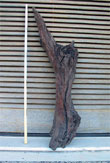
The discovery of an olive branch buried in volcanic ash for centuries is helping scientists pinpoint the date of one of the most powerful volcanic eruptions in the last 10,000 years.
The finding could force archeologists to revise historical timelines for civilizations inhabiting the Mediterranean basin during the Late Bronze Age.
Cultures traditionally thought to have been trading and influencing one another might have actually existed at different times.
Ancient eruption
About 3,500 years ago, a volcano on the Greek island of Thera erupted with such force that it created a column of smoke and debris 23 miles high and flung ash to places as far away as China, Greenland and the western United States.
The blast also triggered 40-foot-high tsunamis that slammed into the island of Crete nearly 70 miles away and likely contributed to the downfall of its famed Minoan civilization.
Despite its widespread influence, the precise date of the eruption has been hard to pin down. Some archeologists have put the event at around 1500 B.C., based on similarities between pottery shards found in Akrotiri, a town buried in ash by the blast, and pottery in Egypt from a period known as the New Kingdom.
Get the world’s most fascinating discoveries delivered straight to your inbox.
Radiocarbon experts, meanwhile, have consistently dated the event to about 100 years earlier.
Now, two new radiocarbon studies detailed in the April 28 issue of the journal Science support the other radiocarbon studies.
One study, led by archeologist Sturt Manning at Cornell University, dated wood and seed samples collected from Akrotiri.
Another study by geologist Walter Friedrich of the University of Aarhus in Denmark and colleagues, uses a single branch to pinpoint the time of death for an olive tree believed to have been buried alive during the eruption. Together, the two studies strongly suggest an eruption date of somewhere between 1600 and 1660 B.C.
About the olive branch, Manning told LiveScience, "It's the only direct piece of evidence that's come along since the beginning of the debate.”
Rewriting history
One important implication of the new eruption date is that civilizations in Crete, Cyprus and Greece couldn’t have traded with Egypt’s New Kingdom as traditionally thought because the latter didn't exist at the time.
Instead of Egypt, these civilizations were probably interacting with the Canaanites, a culture that occupied the Levant, a region that today includes Israel, Palestine, Lebanon and Syria.
It could also explain some anomalies that have long puzzled historians. For example, it's been speculated that there is a connection between Anat, a virgin goddess of war worshipped in the Levant, and Athena, one of the most important goddesses in Greek culture.
The new findings make such a link much more likely, Manning said. "Once people have accepted that this is plausible, they may discover that a few of the problems of how we see the genesis of Western civilization make better sense."
- Volcano Image Gallery
- Greek Shipwreck from 350 BC Revealed
- Newfound Greek Site is Really Ancient
- Palace of Greek Warrior Ajax Said Found
- Ancient Egyptians Held Dwarves in High Esteem
- Volcano Science and History
